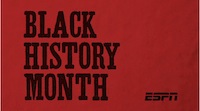SportsCenter anchor Jay Harris honors Martin Luther King Jr. and others by reading to local children
Editor’s note: ESPN celebrates Black History Month throughout February with related programming and content.
With a smile on his face and a copy of Martin’s Big Words: The Life of Martin Luther King, Jr. in hand, SportsCenter anchor Jay Harris prepared for his annual Black History Month reading (one of several Black History Month readings Team ESPN organized across the country) at the Imagine Nation Children’s Museum in Bristol, Conn., near the ESPN campus.
More than 25 children, mostly 4-to-6 year olds, clung to his every word as he brought the book to life.
Following the Wednesday reading, Harris also moderated a Black History Month themed ESPN employee luncheon with Super Bowl hero Doug Williams. In the midst of his busy schedule, Harris spoke with Front Row about the importance of this month.
What does Black History Month mean to you?
Black History Month means a lot to me, my mom and my dad. Those who came before me, that made it possible for me to entertain and inform sports fans. It’s my — and our — time to shine. But it’s also kind of bittersweet for me. I love every February when it comes around, because I know it is the month that this part of American history is showcased. But it’s frustrating because I think many are kind of lazy with Black History Month. I love talking about Martin Luther King Jr. But we barely scratch the surface of Black history and its full impact on American history in the 28 days.
How did you get involved with the reading project?
I love reading to kids, and I volunteered one year and just kept doing it. It sort of morphed into a birthday celebration, because my birthday is also close to reading day. [Editor’s note: Jay is 48 today.]
Do you help with the book selection for the reading?
I don’t help with the book selection for the reading, but I have suggested we skew a little younger with the material, considering the age of the kids in the audience. My job is to make the book come alive, whichever book is selected.
Do you have a particular African-American sports icon that you can identify with and/or someone you interviewed and walked away feeling connected to?
If I had to choose an African American sports icon to identify with, it would be Ola Harris. You may not have heard of her, because she’s my mom. She grew up playing basketball when the women’s game was evolving, when teams put six players on the court, three on one side, three on the other, and you couldn’t cross half court. She wasn’t a superstar. She was just someone who loved the game, decided she wanted to play, and then went out and did it.








